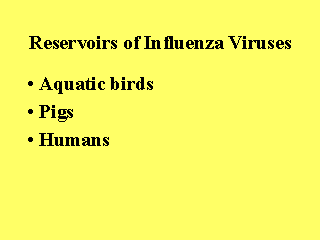 |
Aquatic birds, particularly wild ducks, are primary reservoirs of influenza
viruses. The virus multiplies in the gastrointestinal tract and usually causes
no illness. It is excreted in the feces, and the droppings contaminate the
water. Thus, aquatic birds and domestic fowls become infected in nature by
coming contact with contaminated water. The virus in birds is highly stable
antigenically.
Pigs are considered intermediate hosts for influenza viruses. Pigs possess
receptors for avian influenza viruses. Thus, they can be infected readily by
coming contact with infected birds or water contaminated by them. Avian viruses
may also spread to other mammals such as whales, seals and horses and
occasionally may cause outbreaks. Humans are reservoirs of human influenza
viruses. Pigs, however, may become infected with human influenza viruses.
|
